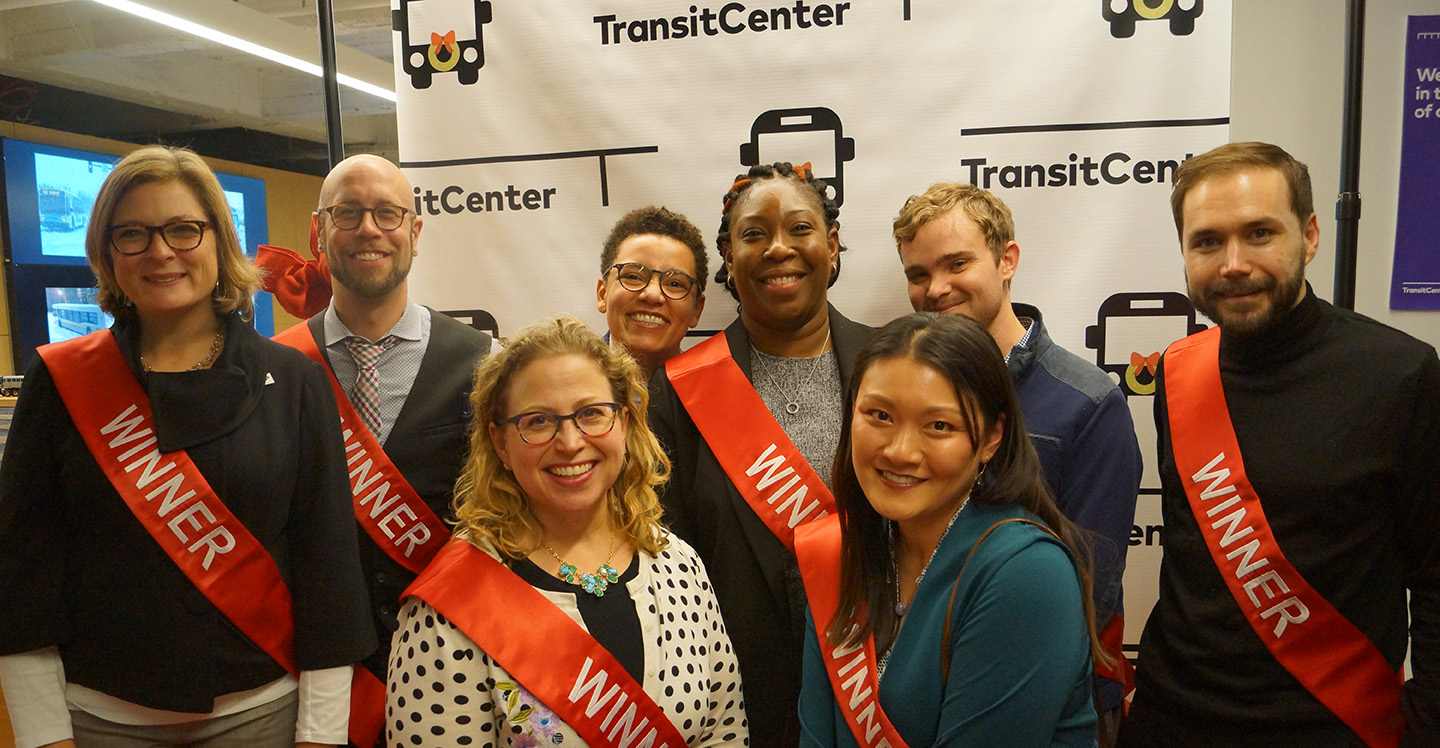
TransitCenter’s year-end awards, The Frequencies, recognize outstanding work by transit agencies and city governments to improve transit service. This is the first year of the awards, which recognize achievements in eight categories.
What TransitCenter consistently hears from transit riders is that the fundamentals of fast, frequent, reliable service and safe, comfortable waiting environments are most important to them. The Frequencies recognize work by public agencies oriented toward delivering these types of transit improvements.
While U.S. transit ridership has been falling for multiple years, the pattern is not uniform. Ridership is rising in cities that are increasing service and where reform-minded agencies are striving to make transit faster and more reliable. The recipients of the Frequencies exemplify the ethic of putting transit riders first and point the way forward for transit policy and practice around the country.
TransitCenter hosted an awards show honoring the winners on December 19. Here, in brief, is why their work is so important.
Best Service Improvement
In 2016, Indianapolis residents voted for a new local tax to fund better transit. IndyGo put that funding to excellent use in 2019 with improvements across its bus network, including more frequent service during off-peak hours.
The flagship project was the Red Line, a center-running rapid bus route that debuted in September and raised the bar for high-capacity service in Indianapolis. But what elevates IndyGo’s service improvements is the agency’s attention to its entire network.
TransitCenter calls these awards “The Frequencies” because in surveys, riders consistently identify more frequent service as their top priority. When people can show up at a stop and know the next bus will come soon, they have more confidence that transit will get them where they need to go. IndyGo’s improvements are delivering that confidence by operating more bus routes every 15 minutes or better, adding frequency at off-peak hours, and running all routes on weekends. People are responding, and IndyGo ridership is on the rise.
These changes are the initial phase in a comprehensive overhaul of IndyGo’s bus network, which will accelerate in 2020, producing a much more robust network that puts all-day, every-day frequent service within reach of many more residents.
Best Bus Stop Improvement
The quality of bus stops is one of the most important but overlooked aspects of the transit experience. In surveys, transit riders consistently say that they highly value safe, comfortable bus stops.
For their commitment to improving bus stops and pedestrian access to transit, San Antonio VIA wins this Frequency.
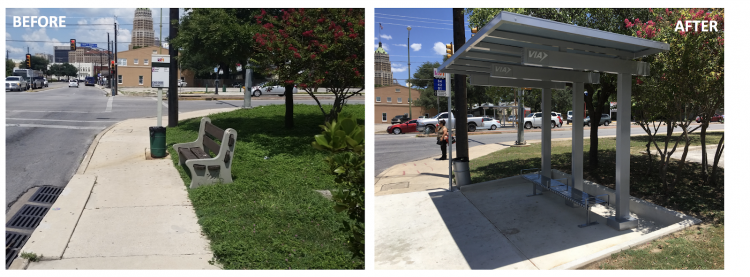
In a precedent-setting commitment to bus stop upgrades, VIA installed sidewalk improvements and shelters at more than 1,000 stops in three years. With 2,300 shelters systemwide, San Antonio bus riders now begin nearly 95% of their trips at an accessible stop with a shelter. No other American city of comparable size has made such comprehensive improvements to bus stops in such a short amount of time.
Best Transit Street
The District Department of Transportation’s new bus lanes on H Street and I Street gave priority to transit riders where they need it most: two very congested downtown streets that are critical to the bus network.
Between them, H Street and I Street carry bus routes used by 20% of all Metrobus riders, with buses coming more than once a minute during peak hours. Bus lanes on the congested downtown segments of these streets had been percolating for some time. This spring, spurred by disruption to a metro line for rehab work, DDOT took rapid action. Red bus lanes were implemented on H and I in a matter of days.
The bus lanes improved peak hour speeds, and after a summer trial DDOT decided to make them permanent. With momentum for a “bus transformation” building among transportation agencies in the DC region, the H Street and I Street project has shown how to deliver transit-priority streets on a faster timetable.
Best Transit Priority Program
With its citywide effort to add bus lanes and signal priority for buses, New York City DOT brings home the award for Best Transit Priority Program.
NYC DOT began the year releasing its Better Buses Action Plan and concluded it with an agency record for new bus lane mileage under its belt, including the celebrated 14th Street busway. While the impressive results on 14th Street have won deserved acclaim (a 36% improvement in weekday travel time and 24% increase in ridership), it’s the full package of projects that makes NYC DOT’s bus priority program the national leader. On Fresh Pond Road in Queens, bus speeds have more than doubled during hours when the new bus lane segment is in effect. On several other routes, NYC DOT has lengthened bus lanes, extended hours of operation, and modified design to reduce incursions by other vehicles.
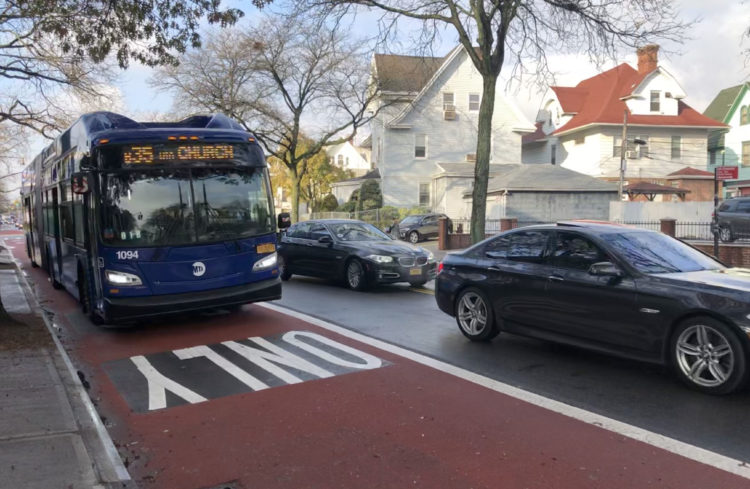
In major cities across the nation, mounting traffic congestion slows down bus service. NYC DOT’s systemic approach is a model for big-city departments of transportation looking to help get transit moving again.
Best Accessibility Program
The Massachusetts Bay Transportation Authority wins this award in recognition of the outstanding reliability of MBTA station elevators.
In 2005, MBTA elevators were wholly unreliable. Uptime was 90-95% system-wide and many of the T’s core elevators where out of service more than they were in service. To put 90% uptime into perspective, it means that over the course of a year the average elevator was out of service for more than an entire month. Coupled with the fact that most trips require the use of 3 to 4 elevators, the odds were high that a given trip would be rendered inaccessible by an out of service elevator.
Today it’s a completely different story: With 174 elevators in public use, uptime remains consistently at 99.4% or better system-wide. Prompted by advocacy by riders with disabilities, in 2006 the MBTA changed its elevator contract from a repair-based approach to a preventive maintenance approach, focusing on fixing and replacing parts before they caused disruptions. In 2019, elevators are now one of the most reliable aspects of MBTA service—and widely used by many riders with disabilities, seniors, families with strollers and tourists.
Best Communications
To improve service, agencies have to make the case to the public for reforms that will make transit faster and more reliable. With LA Metro undertaking a variety of efforts to turn bus performance around, its digital communications team is helping to tell that story.
From a viral video featuring the new Flower Street bus lane to clever bus GIFs to clear and consistent communication around bus rapid transit open houses, the digital team has been generating enthusiasm around bus improvements and situating them as critical to making transit work in LA. The team is also sharing positive feedback from LA Metro’s social media followers about buses improvements within the agency, helping to make the case for additional upgrades.
As LA Metro moves forward with the Next Gen bus initiative, including a redesign of its bus network, the work of the communications team will be essential.
Best Employee Engagement
Transit agencies are at their best when there are clear, open lines of communication between management and frontline staff. The Maryland Department of Transportation Maryland Transit Administration (MDOT MTA) Inreach Program wins this award in recognition of the model they created for internal communications between bus operators and management.
Recognizing that management presentations at town-hall meetings were not reaching most bus operators, the Inreach Program developed a suite of communication methods to receive and respond to bus operator feedback. Inreach staff now hold open hours for operators at different divisions to share ideas, and host regular conversations between operators and executives. Comments from bus operators inform agency decision-making, and the Inreach Program updates bus operators about how management has incorporated their ideas.
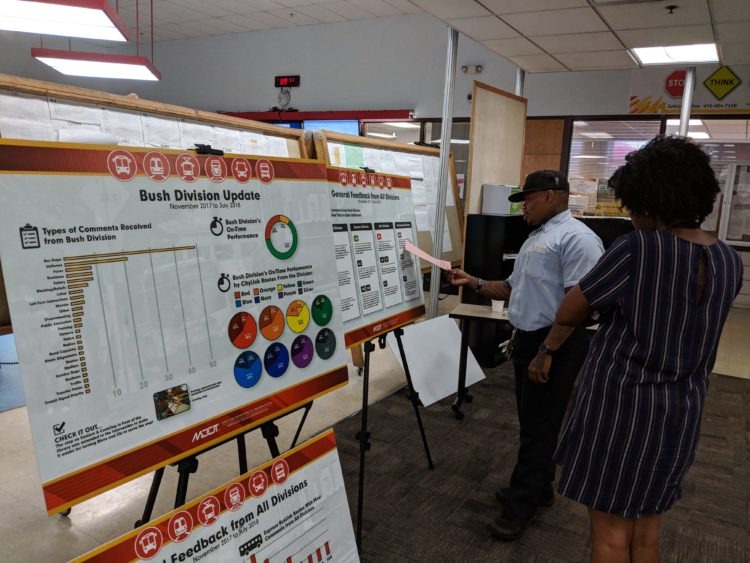
Through this process, MDOT MTA has adjusted scheduled run times, posted more legible fare information to buses, and improved restroom access for bus operators, among other changes. At a time when transit agencies are struggling to retain staff, morale among MDOT MTA bus operators is on the rise.
Good Governance Award
The MBTA’s Fiscal and Management Control Board (FMCB) was established after winter storms brought the Boston transit system to its knees in 2015.
In 2019, the FMCB made strong statements about upgrading rail and bus service in the Boston region, taking ideas from the advocacy community and putting them squarely on the official policy agenda. Members of the board have sounded alarms about the agency’s ability to maintain and operate the system given current funding levels. In November, the board approved a package of resolutions to systematically overhaul bus service and transform the commuter rail network into “regional rail” that operates more frequently, with more affordable fares.
While the MBTA has much more work to do to regain the full confidence of Boston transit riders, the FMCB has laid out an independent, rider-focused, forward-looking reform agenda as it tends to the nuts and bolts of fiscal health and system maintenance.
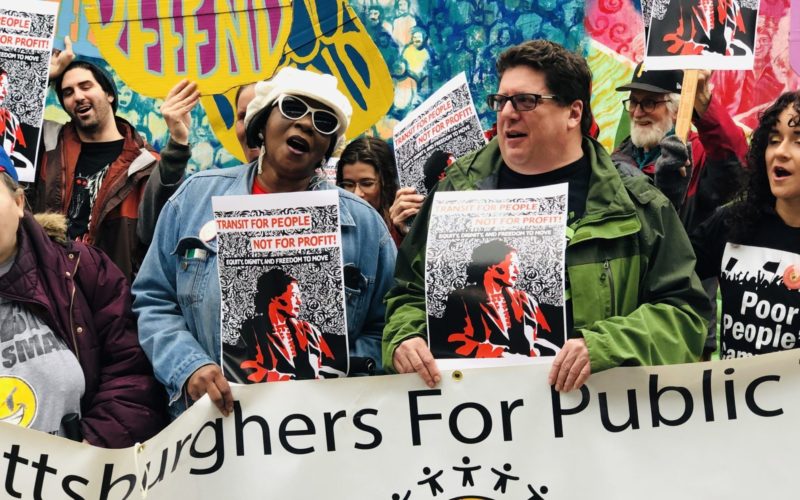 And the 2022 Frequency Award Winners Are….
And the 2022 Frequency Award Winners Are….
TransitCenter’s 4th Annual Frequency Awards continues our annual tradition of recognizing transit agency staff, DOT staff, advocates, and elected officials who worked tirelessly to improve transit in 2022.
Read More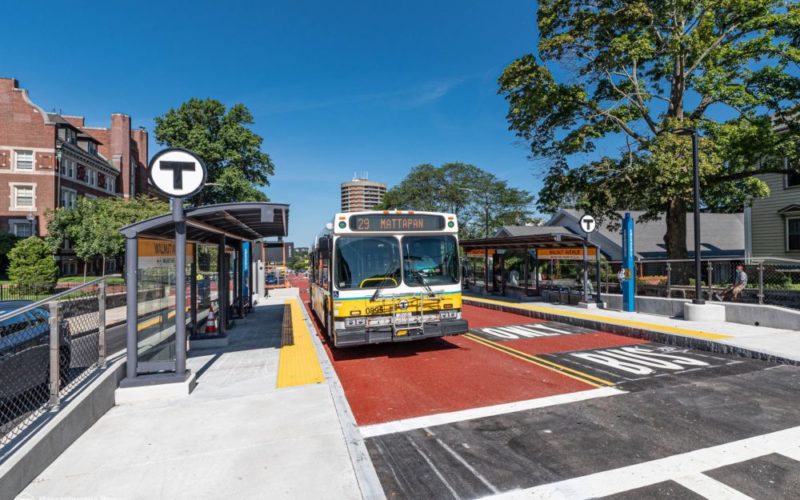 Announcing the 2021 Frequency Award Winners!
Announcing the 2021 Frequency Award Winners!
TransitCenter’s annual Frequency Awards recognize outstanding work in the transit field. Here are the 2021 honorees...
Read More